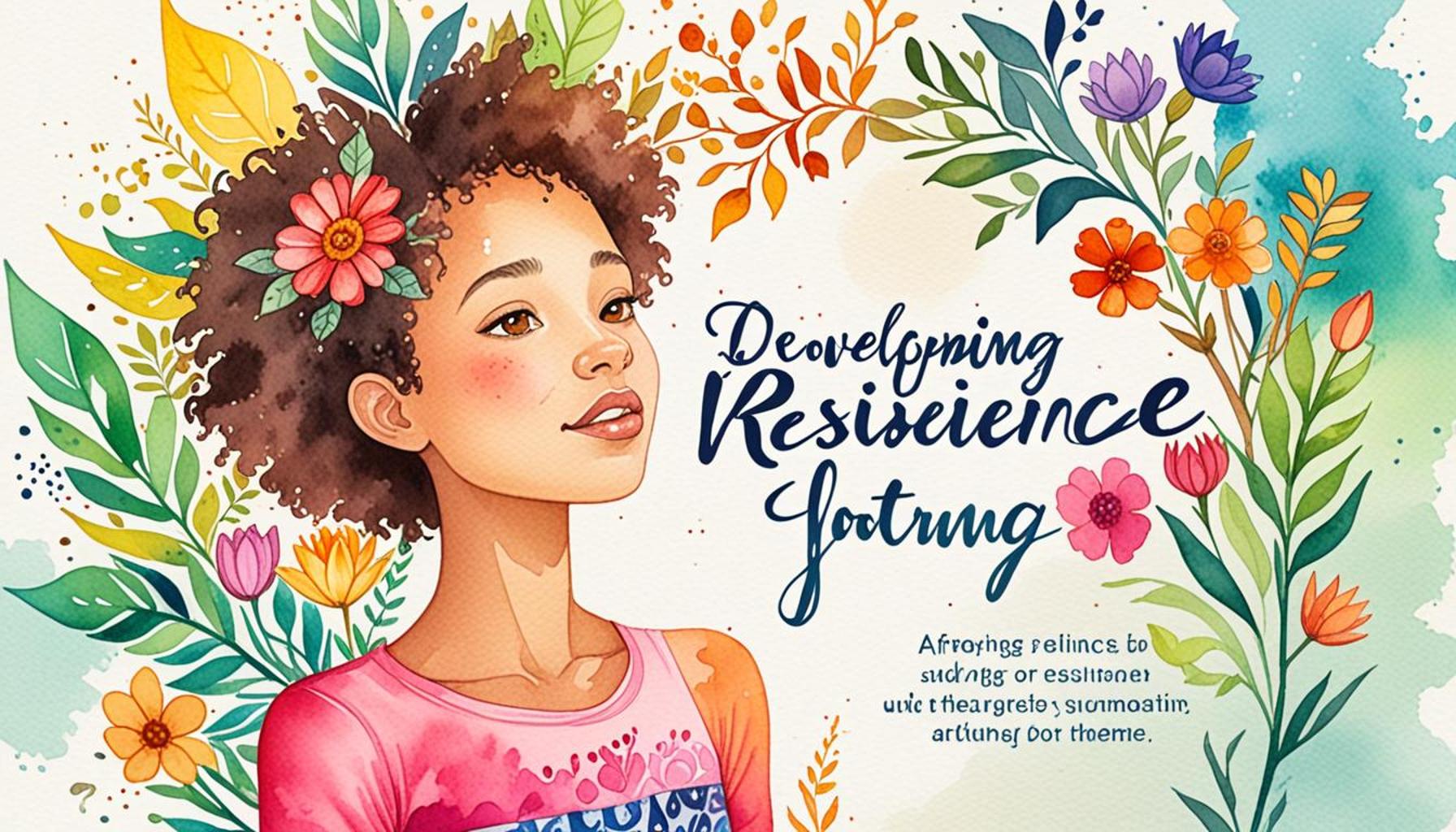Developing Resilience Through Affirmations: Practices for Growing Youth

Building Strength from Within
In today’s fast-paced world, young individuals face unique challenges that test their emotional strength on a daily basis. From academic pressures to societal expectations, these challenges can feel overwhelming at times. As a result, the development of resilience—the ability to bounce back from adversity—has become increasingly essential for personal growth and well-being. One powerful tool that can aid in this development is the use of affirmations, which can play a pivotal role in reshaping a young person’s mindset.
What are Affirmations?
Affirmations are positive statements designed to challenge and counteract negative thoughts and beliefs. They serve as a means of reprogramming our thinking patterns to be more constructive. For youth in Nigeria, where cultural expectations may enforce rigid standards around success, identity, and even behavior, affirmations can be particularly effective. By consistently practicing affirmations, young people can:
- Boost their self-esteem: For instance, repeating statements like “I am capable of achieving my goals” can replace self-doubt with confidence.
- Cultivate a positive mindset: Using affirmations, such as “I embrace challenges as opportunities,” can transform how young individuals view obstacles in their paths.
- Enhance their coping skills: Reciting affirmations during stressful times—like exams or family pressures—can provide a sense of calm and clarity.
Why Focus on Resilience?
Resilience is crucial for youth to effectively navigate life’s hurdles. Whether these challenges arise within the educational system, from peer pressure, or through familial expectations, building resilience can significantly alter one’s life trajectory. By developing this capacity, young individuals can experience:
- Improved academic performance: Research indicates that resilient students often achieve higher grades, as they are more likely to persist through difficulties.
- Stronger interpersonal relationships: Those who practice resilience often develop better communication skills and empathy, fostering deeper connections with peers and family alike.
- A greater sense of purpose and direction: When young people learn to harness resilience, they tend to aim for meaningful goals, contributing positively to their communities.
Exploring the intersection of resilience and affirmations provides invaluable practices for nurturing youth. For example, community programs that integrate affirmation workshops can effectively engage young people in discussions around emotional strength. As we delve deeper into this topic, you will discover practical methods that empower young individuals, from creating personalized affirmations to incorporating resilience-building exercises into daily routines. By investing in these tools, we can help mold a generation that is not just surviving but thriving in the face of adversity.
ADDITIONAL INSIGHTS: Expand your understanding here
Utilizing Affirmations for Inner Strength
Affirmations are more than just feel-good phrases; they are impactful tools rooted in psychological principles that can spur transformation in young minds. When young individuals engage with positive affirmations, they can significantly alter their perception of both themselves and their environments. This practice is particularly critical in Nigeria, where societal pressures can often stifle creativity and self-expression. By fostering a culture that embraces affirmations, communities can effectively nurture resilience and emotional well-being.
The Science Behind Affirmations
Research in psychology has found that affirmations can lead to measurable improvements in mental health and resilience. The backbone of this effectiveness lies in the concept of self-affirmation theory, which suggests that reminding individuals of their core values and strengths can help mitigate defensive responses and promote adaptive coping strategies. This means that when youth affirm their capabilities, they not only counteract negative self-perceptions but also reinforce a stronger sense of identity.
- Shift in Mindset: Regularly practicing affirmations can help shift a youth’s mindset from a fixed to a growth perspective. For instance, statements like “I learn from my mistakes” encourage a belief in the potential for growth.
- Increase in Motivation: Affirmations can enhance intrinsic motivation. When young people tell themselves, “I am worthy of success and happiness,” they are more likely to pursue their goals diligently.
- Lowered Anxiety Levels: Individuals who maintain a practice of affirmations often report reduced feelings of anxiety, especially in high-pressure situations such as exams or public speaking events.
Practical Approaches to Implement Affirmations
To effectively harness the power of affirmations, young people in Nigeria can employ various approaches tailored to their unique experiences. Personalizing affirmations allows individuals to connect deeply with their meanings. Here are some strategies to consider:
- Create a Vision Board: Encourage young individuals to compile images and phrases that resonate with their aspirations, incorporating their affirmations. This visual representation serves as a daily reminder of their goals and potential.
- Daily Reflection: Encourage youths to dedicate a few moments each day for verbal or written affirmation practice. This could involve looking into a mirror and saying their affirmations aloud, which reinforces self-belief.
- Group Affirmation Sessions: Schools and community centers can facilitate group sessions where youth come together to share and support one another’s affirmations. This fosters a sense of community and collective strength.
By integrating these practices, not only can young people boost their self-esteem and motivation, but they can also cultivate an environment where resilience flourishes. In an era where mental health discussions are becoming ever more significant, empowering youth through affirmations is a proactive step towards shaping a brighter future. By instilling this practice, we are not just helping individuals develop resilience, but we’re also creating a generation that can navigate life’s challenges with strength and confidence.
| Advantage | Description |
|---|---|
| Enhanced Self-Esteem | Affirmations boost self-image by reinforcing positive thoughts and beliefs. |
| Stress Reduction | Practicing affirmations can alleviate anxiety, creating a calmer mindset in youth. |
| Increased Motivation | Affirmations inspire youth to set and pursue personal goals with greater determination. |
| Stronger Coping Mechanisms | They equip youth with the tools to face challenges effectively and constructively. |
Engaging in the practice of affirmations can play a crucial role in nurturing resilience among youth. For instance, the simple act of stating affirmations can lead to a remarkable transformation in one’s mental framework. Through consistent repetition, children learn to recognize and challenge negative self-talk, paving the way for healthier thought patterns. Not only does this foundation help in their academic journey, but it also peers into their emotional well-being.Moreover, the emphasis on positivity can ignite a sense of empowerment. When youth observe positive affirmations manifesting in their lives, it encourages them to approach challenges with optimism rather than fear. This is where the value of guided practices and collaborative environments becomes apparent. Group affirmations or peer sessions can amplify the benefits, allowing them to witness the collective growth and support within their community.Furthermore, integrating these practices into daily routines fosters an emotional toolkit that youth can lean on throughout their lives. Coupled with physical activities and mindfulness exercises, affirmations can create a holistic approach to well-rounded mental health support in their formative years.As parents and educators, exploring such practices is vital for equipping the next generation with the skills necessary to navigate both personal and academic challenges, setting a precedent for lifelong resilience and strength.
SEE ALSO: Click here to read another article
Empowering Youth Through Group Practices
In the pursuit of resilience through affirmations, the collective experience plays a pivotal role. Youth do not develop in isolation; rather, their emotional and psychological frameworks are heavily influenced by their social environments. As such, implementing group practices centered around affirmations can amplify the impact on resilience building. In Nigeria, where communal bonds are deeply ingrained, leveraging group affirmations can foster both individual growth and collective resilience.
The Power of Community in Affirmation Sessions
When young individuals come together for affirmation sessions, the collective atmosphere can significantly enhance the experience. Community-driven initiatives can create safe spaces where youth feel supported and understood. Such environments are invaluable in helping them openly express their feelings and aspirations. Group affirmation practices can include:
- Group Workshops: Schools and youth organizations can host workshops that guide participants through the process of creating and sharing personalized affirmations. An environment of shared vulnerability encourages empowerment and connection among peers.
- Peer Support Groups: Establishing peer-led discussion circles can encourage young individuals to express their experiences related to failure and success. During these meetings, members can share affirmations and uplift one another’s spirits.
- Community Events: Engaging the community through events that center on affirmations can also spread awareness. Activities like talent shows or cultural fairs where youth present their affirmations can promote mental wellness.
Incorporating Technology in Affirmation Practices
In today’s digital age, technology serves as a double-edged sword. However, when utilized effectively, it can enhance the process of developing resilience through affirmations. Especially in Nigeria, where mobile phone usage is on the rise, creative uses of technology can help youth to practice affirmations daily. Here are some innovative approaches:
- Mobile Applications: Developing or utilizing existing affirmation apps can provide youth with daily reminders. These apps can offer customizable affirmations, allowing users to personalize their experiences based on current needs and aspirations.
- Social Media Challenges: Launching social media challenges encouraging youth to share their affirmations can harness the power of community while reaching a wider audience. For instance, a #MyDailyAffirmation challenge can inspire more young individuals to engage with positive self-talk.
- Video Journals: Encouraging youth to create video journals documenting their journeys with affirmations can add a layer of accountability. It allows them to visually track their growth and reflect on their emotional progress over time.
Facilitating access to resilience-building practices through the integration of technology not only modernizes the affirmation process but also caters to the interests of tech-savvy youths. The emerging trend of digital storytelling can allow Nigerian youth to share their narratives, experiences, and affirmations, thus creating relatability with peers facing similar challenges.
Promoting resilience through affirmations is a multifaceted endeavor that requires community collaboration, technological innovation, and personalized practices. By offering diverse methods of engagement, we empower the rising generation to take ownership of their mental well-being, fortifying their capacity to handle life’s adversities with renewed strength.
YOU MAY ALSO LIKE: Read read another article
Conclusion: Fostering a Resilient Future
As we navigate the transformative journey of nurturing resilience in the youth of Nigeria, the significance of affirmations becomes increasingly clear. By providing practical frameworks that integrate community engagements and technological innovations, we equip young individuals with essential tools for mental well-being. The strategies outlined—ranging from group workshops and peer support to mobile applications and social media challenges—serve not only to bolster individual confidence but also to cultivate a sense of shared strength among peers.
The foundation of resilience is built upon the ability to confront challenges with a positive mindset. The power of affirmations lies in their ability to instill self-belief and promote an optimistic outlook. These practices, when embraced in supportive community settings, can transform the way youth perceive themselves and their capabilities. Furthermore, leveraging emerging technology to foster daily engagement with affirmations allows for a modern approach to resilience that resonates with today’s tech-savvy generation.
In conclusion, as stakeholders in the development of youth—parents, educators, and community leaders—it’s imperative to recognize the potential of affirmations in driving emotional and psychological growth. Together, let us commit to enriching the lives of our youth. By encouraging self-affirmation as a staple in their daily lives, we nurture not just resilient individuals, but a resilient society poised to face the uncertainties of tomorrow. In the quest for resilience, let’s stand united, continuously exploring innovative practices that allow Nigeria’s youth to thrive against all odds.


